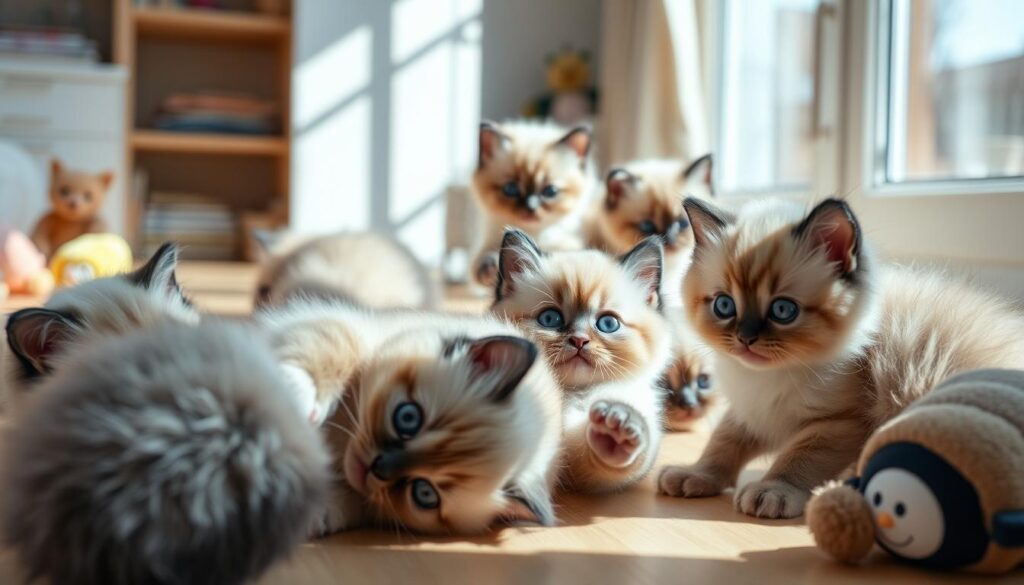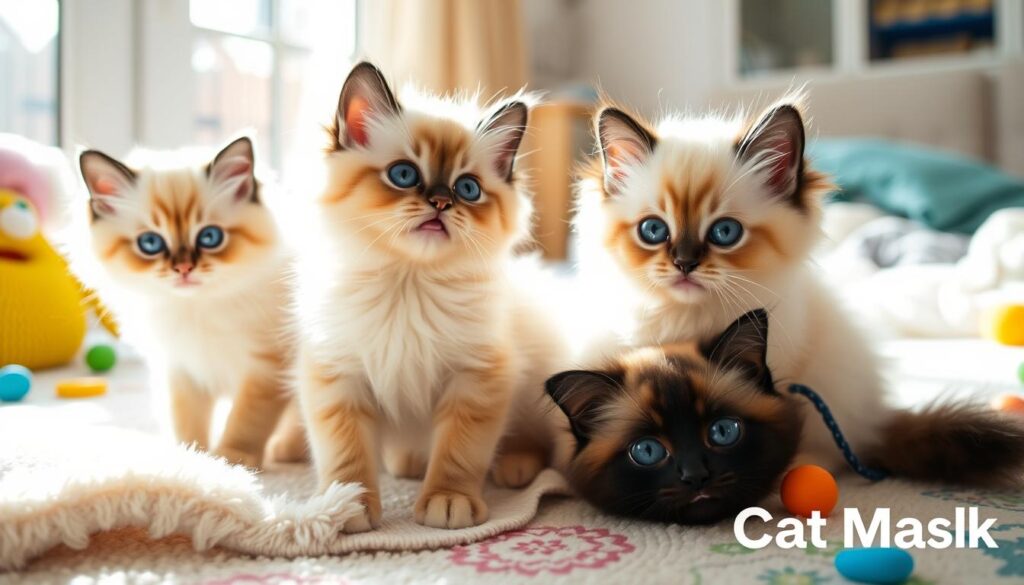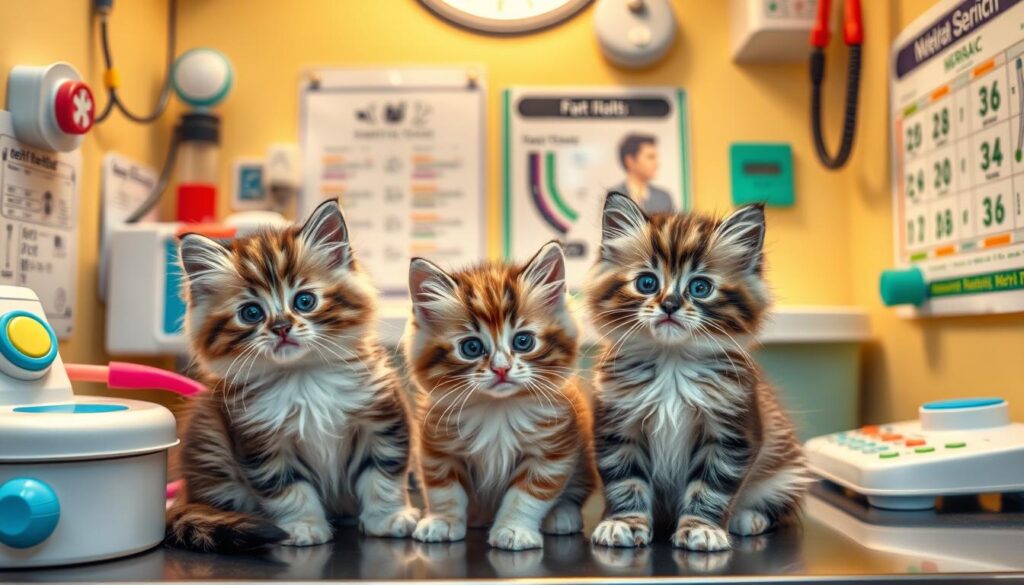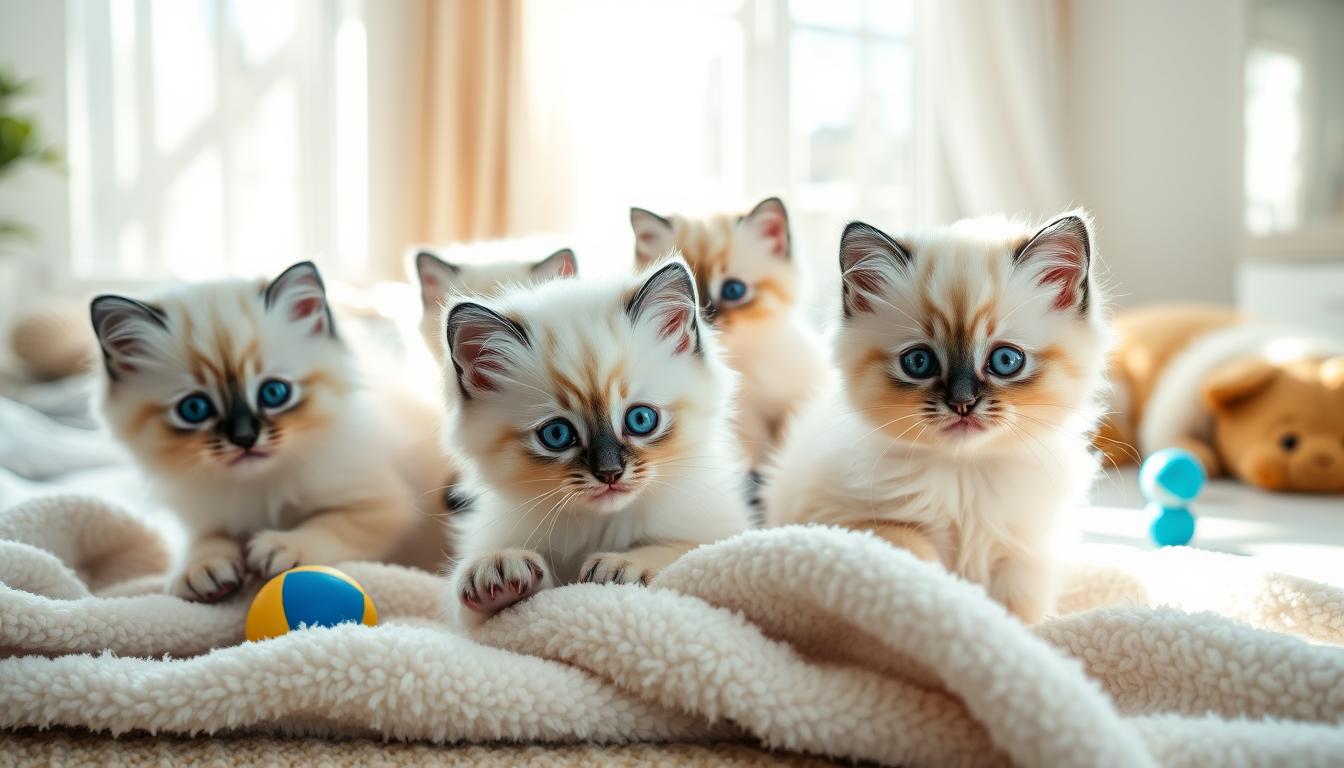Looking into a Ragdoll kitten’s blue eyes, you can’t help but feel a strong bond. These cats are known for their grace and charm. They have a personality that will win your heart right away.
Whether you love cats or are new to pet ownership, Ragdoll kittens are irresistible. They bring joy and affection into your life.
Table of Contents
Understanding the Unique Charm of Ragdoll Kittens
Ragdoll kittens are a true delight, captivating hearts with their striking physical features and charming personalities. As Floppy Cats, these purebred kittens are known for their remarkable color development and the famous “floppy” trait that makes them irresistible.
Physical Characteristics and Color Development
Ragdoll kittens are born solid white and gradually develop their true colors and patterns over the first 5-8 weeks of life. Their coats continue to deepen in hue over the next 18 months, creating a stunning transformation. The Seal Colorpoint Ragdoll, in particular, is distinguished by its captivating blue eyes and semi-long, silky fur that requires regular grooming.
The Famous “Floppy” Personality Trait
One of the most endearing qualities of Ragdoll kittens is their “floppy” nature. These Floppy Cats often go limp when held, earning them the affectionate nickname. This trait, combined with their playful yet laid-back temperament, makes Ragdolls adaptable to various living situations and ideal companions for families or individuals who spend a lot of time at home.
Growth and Development Stages
Ragdolls mature at a slower pace compared to other breeds, taking up to 4 years to reach their full size. As Purebred Kittens, they are smaller in size during their kitten stage, but their extended growth period allows them to develop into the large, affectionate cats they are known for.

“Ragdoll cats have an easy-to-manage grooming routine, requiring regular brushing a few times a week to keep their coat looking its best due to their semi-long plush coat.”
The Origins and Breed Standards of Ragdolls
Ragdoll kittens are a favorite among cat lovers. They are known for their great temperament, health, and strict breed standards. These cats were first developed in the 1960s and became recognized by the Cat Fanciers’ Association (CFA) in 2000.
Responsible Ragdoll breeders make sure each kitten meets the breed’s high standards. These standards cover physical traits, coat patterns, and colors. Only 100% purebred, blue-eyed pointed Ragdolls are bred, with no mixed breeds allowed.
Ragdolls are famous for their big, muscular bodies, broad heads, and medium-length coats. Their eyes are bright blue and oval-shaped, and their ears are medium-sized with rounded tips. Ragdoll cats can reach impressive sizes, with some males weighing over 20 pounds.
Responsible breeders give buyers registration papers to prove a kitten’s purebred status. These papers show the kitten’s lineage and the breeder’s dedication to high standards.

Ragdolls come in many colors, including seal, blue, chocolate, lilac, red, and cream. They have four patterns: bi-color, van, mitted, and colorpoint. This variety makes them stand out visually.
Whether you’re a cat lover or a first-time pet owner, Ragdolls are a great choice. They have a wonderful temperament, and excellent health, and meet strict breed standards. They make loyal, affectionate, and beautiful companions for families.
Essential Health Testing and Genetic Screening
As a responsible Ragdoll kitten owner, it’s crucial to ensure your furry companion’s well-being. Reputable breeders conduct extensive health testing. They screen for various genetic conditions that can affect Ragdolls. These tests include screening for Feline Leukemia (FeLV), Feline Immunodeficiency Virus (FIV), Polycystic Kidney Disease (PKD), Progressive Retinal Atrophy (PRA), and Hypertrophic Cardiomyopathy (HCM).
Common Health Tests for Ragdoll Kittens
- Feline Leukemia (FeLV) and Feline Immunodeficiency Virus (FIV) testing
- Polycystic Kidney Disease (PKD) screening
- Progressive Retinal Atrophy (PRA) assessment
- Hypertrophic Cardiomyopathy (HCM) examination
- Pyruvate Kinase Deficiency (PK Deficiency) test
- Screening for additional genetic conditions, such as Diabetes Mellitus and lower urinary tract diseases
Understanding Genetic Health Guarantees
Reputable breeders often provide genetic health guarantees. These guarantees ensure the long-term well-being of their Ragdoll kittens. They cover the results of comprehensive health tests and give new owners peace of mind. By understanding these guarantees, you can make an informed decision when choosing your Ragdoll kitten.
Importance of TICA and CFA Registration
The International Cat Association (TICA) and the Cat Fanciers’ Association (CFA) are leading authorities on purebred cats, including Ragdolls. Ensuring your Ragdoll kitten is registered with these organizations is crucial. It verifies the kitten’s purebred status and adherence to breed standards. This registration also provides access to valuable resources and a supportive community of Ragdoll enthusiasts.
| Genetic Test | Affected Breeds | Importance |
|---|---|---|
| Polycystic Kidney Disease (PKD) | Persians, Persian-related breeds | The most common single-gene inherited disease in cats |
| Pyruvate Kinase Deficiency (PK Deficiency) | Abyssinians, Somalis, other breeds | Causes chronic anemia and life-threatening complications |
| Progressive Retinal Atrophy (PRA) | Persians, Bengals, Abyssinians | No treatment is available, which leads to blindness |
| Hypertrophic Cardiomyopathy (HCM) | No treatment is available, leads to blindness | The most common heart disease in cats can be fatal |

By prioritizing Kitten Health and Genetic Screening, you can ensure your Ragdoll kitten’s long-term well-being. This way, you can enjoy a lifetime of companionship with a healthy, vibrant feline friend.
Ragdoll Kittens: Care and Nutrition Requirements
Caring for Ragdoll kittens means focusing on their special nutritional needs. These cats grow slowly, so they need a diet that supports their growth. It’s important to provide the right care and nutrition for them to reach their full potential.
Ragdoll kittens do best on high-quality, protein-rich foods. Many breeders suggest starting with Science Diet Kitten. They also recommend adding grain-free wet food, freeze-dried raw diets, and fresh cooked chicken. The ideal ratio of protein to fat is 3:1, which helps them grow and stay healthy.
- Ragdoll kittens should eat 4 times a day for the first 6 months to meet their energy needs.
- Switch to an adult Ragdoll formula, like Royal Canin Ragdoll, around 1 year old.
- Kittens under 9 weeks old should use non-clumping litter to avoid eating it.
- Start with wet food slowly in the first 2 weeks to prevent stomach problems.
Proper care and nutrition are key for Ragdoll kittens. They can get dental problems and sensitive stomachs if their diet isn’t right. A balanced, high-quality diet supports their growth and sets them up for a healthy life.
“Ragdoll kittens require specialized Nutrition to thrive, with a focus on protein, fat, and overall balance. Neglecting their dietary needs can lead to a range of health problems down the line.”
Socialization and Behavioral Development
Raising a well-adjusted Ragdoll kitten is key to their growth. They are calm and adaptable, making great family pets. Socialization and positive training are essential for their development.
Early Life Experiences
Ragdoll kittens grow up in homes with lots of human interaction. This makes them social and less likely to be fearful. They also get along well with other pets, like dogs.
Family Integration Techniques
Bringing a Ragdoll kitten into your family needs patience and consistency. Getting everyone involved in training and bonding is important. Regular grooming and vet visits keep them healthy.
Training Tips and Best Practices
Ragdoll kittens are smart and can learn like dogs. Positive reinforcement, like clicker training, works well. It teaches them tricks and strengthens their bond. Keeping training consistent is crucial for success.
Focus on socialization, a loving home, and positive training. Your Ragdoll kitten will grow into a loyal and loving pet. The effort you put in early on will be worth it.
Choosing the Right Age to Bring Home Your Kitten
Timing is key when it comes to Kitten Adoption. Ragdoll kittens should be at least 12 weeks old before they go home. Some breeders wait until 14-18 weeks. This extra time helps with weaning and development, making sure the kitten is healthy and eating well.
Kittens shouldn’t be adopted before 12 weeks. This is a critical time for them to learn from their mother. They learn important skills like social cues and how to use a litter box. Taking a kitten away too early can cause behavioral problems later on.
“Kittens that are adopted at the right age, around 12-18 weeks, often have an easier time adjusting to their new homes and forming strong bonds with their human families.”
When you’re ready to get a Ragdoll Kitten, find a good breeder. They can help you pick the best age for your kitten. This ensures a smooth start in your kitten’s new home.
| Kitten Age | Developmental Milestone | Adoption Recommendation |
|---|---|---|
| Before 12 weeks | Crucial period for learning and development under mother’s care | Not recommended |
| 12-14 weeks | Weaning completed, eating solid food, and socialized | Crucial period for learning and development under the mother’s care |
| 14-18 weeks | Additional time for further development and socialization | Recommended for best adjustment |
Choosing the right age for your Ragdoll Kitten ensures a smooth transition. This leads to a lifetime of happiness and companionship.
Finding Reputable Ragdoll Breeders
When looking for a Ragdoll kitten, finding a good breeder is key, not just where they are. Good breeders focus on health, socialization, and following breed standards. They give you papers, health promises, and are open about how they breed.
What to Look for in a Quality Breeder
- Registration with TICA or CFA, the leading cat breed registries
- Comprehensive health testing for genetic conditions common in Ragdolls
- Detailed health guarantees and a willingness to address any health concerns
- Adherence to the Ragdoll breed standard set by TICA or CFA
- Involvement in Ragdoll cat shows and breed-specific organizations
- Emphasis on socialization and positive early-life experiences for kittens
- Transparent communication about breeding practices and kitten availability
- Positive online reviews and references from previous customers
Red Flags to Watch Out For
Be cautious of breeders who:
- Cannot provide registration papers or health test results
- Sell kittens before they are 12-14 weeks old
- Have an inconsistent or unclear application and adoption process
- Lack a working relationship with a veterinarian or do not offer a health guarantee
- Appear to prioritize profit over the well-being and quality of their Ragdoll kittens
By researching and finding a reputable Ragdoll breeder, you ensure your kitten is healthy and well-socialized. This choice will bring joy and a loving companion to your home for years.
Cost Considerations and Investment
Getting a Ragdoll kitten is a big deal. It’s a long-term commitment to a loving friend. The price can range from $2,400 to $6,000, depending on the breeder. This cost covers the kitten’s health checks, socialization, and care.
The cost doesn’t stop at the initial payment. You’ll also need to think about vet bills, supplies, and ongoing care. Many breeders include the first vet visit, spaying/neutering, and microchipping in the price. This can save you money right away.
Ragdolls are bigger than most cats. Males can weigh 12 to 20 pounds, and females 8 to 15 pounds. This means they eat more and need more grooming. You’ll also need to budget for regular vet visits, which can cost between $200 and $600 a year.
| Expense | Estimated Cost |
|---|---|
| Ragdoll Kitten Purchase Price | $2,400 to $6,000 |
| Transportation Fees (within the US) | $500 to $1,000 |
| Annual Veterinary Expenses | $200 to $600 |
| Monthly Cost of High-Quality Cat Food | $20 to $50 |
| Monthly Expenses for Litter, Toys, Grooming, and Supplies | $20 to $50 |
| Cost per Grooming Session | $50 to $100 |
| Monthly Budget for Toys and Enrichment | $10 to $30 |
Buying a Ragdoll kitten from a good breeder means you’re getting a healthy, friendly cat. The initial Kitten Cost might be more than other cats, but the Investment is worth it. A Ragdoll can bring years of happiness and companionship to your family.
Conclusion: Making the Right Choice for Your Family
Ragdoll kittens can be great Family Cats because they are gentle and easy to get along with. These Hypoallergenic Kittens are often chosen by families looking for a loving pet. It’s key to think about your lifestyle, the kitten’s personality, and the breeder’s reputation when picking one.
With the right care and a loving home, a Ragdoll can become a beloved family member. They bond well with people and other pets, bringing joy and laughter. Finding a good breeder ensures your Ragdoll kitten has a great start, leading to a lifetime of love and companionship.
Choosing a Ragdoll kitten is a big decision, but with the right info, you’ll know you’re making a great choice. By focusing on your Ragdoll kitten’s health, temperament, and happiness, you’ll gain a furry friend who will make your life richer in many ways.


1 thought on “Ragdoll Kittens”
Comments are closed.